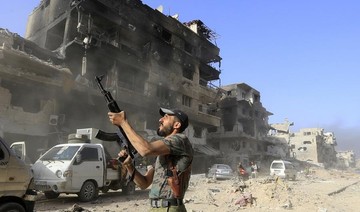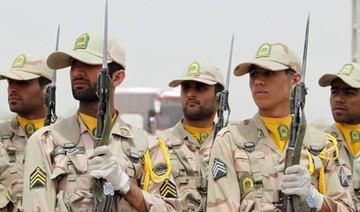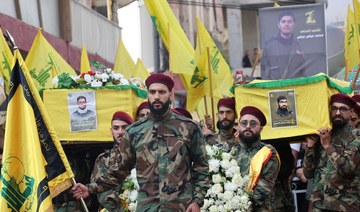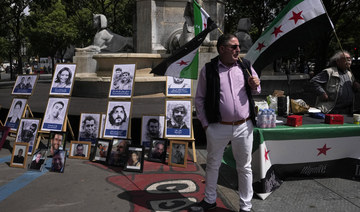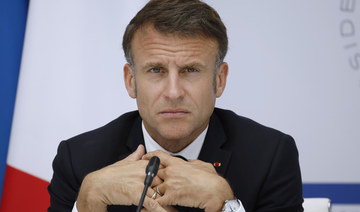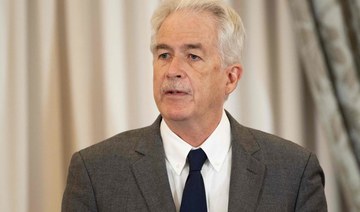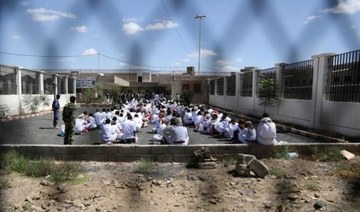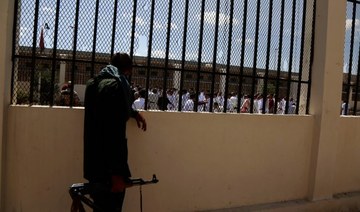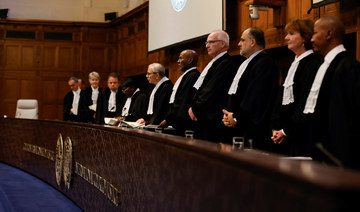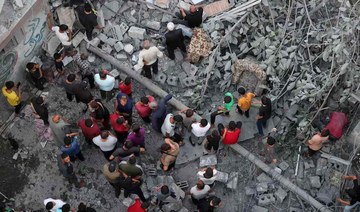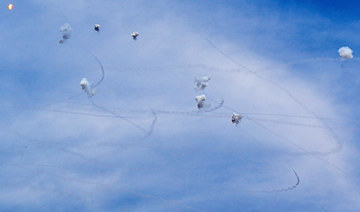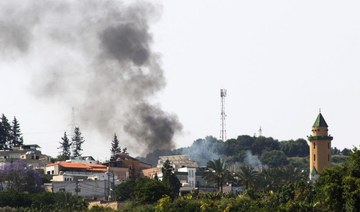BEIRUT: Regime forces killed at least 15 civilians Sunday in air strikes carried out in northwestern Syria in apparent retaliation for a militant attack on two besieged government-held villages, a monitor said.
The bombing raids hit a string of towns and villages in the northwestern province of Idlib, which is almost entirely controlled by various militants and hard-line rebels.
In the town of Taftanaz the strikes killed 10 civilians, including four children, said the Britain-based Syrian Observatory for Human Rights.
Observatory head Rami Abdel Rahman said strikes had also hit near a children’s hospital, putting it out of service.
Five other civilians were killed in raids that hit other towns.
The air strikes came a day after militants from Al-Qaeda’s former Syrian affiliate launched an attack on Fuaa and Kafraya, two villages held by the regime but cut off by hard-line forces.
Late Saturday, Hayat Tahrir Al-Sham (HTS) and allied fighters shelled Fuaa and Kafraya heavily and clashed with local fighters.
“This is the fiercest attack in around three years,” Abdel Rahman said, adding that Sunday’s deadly air strikes were in response to the militant attack.
Six Syrian pro-regime fighters and at least three from HTS were killed in the fighting, which continued on Sunday.
Syrian state news agency SANA also reported Saturday’s attack, and said local fighters were able to push back the militants.
Fuaa and Kafraya are the only two places in Syria currently designated as besieged by the United Nations after the government recaptured the Yarmuk Palestinian camp in southern Damascus.
The villages are home to an estimated 8,100 people.
They came under siege in 2015, when rebels ousted regime forces from a vast majority of Idlib province.
Since then, the mainstream opposition’s influence has dwindled as militants solidified their grip on the province, and regime forces have recaptured an eastern sliver of Idlib.
HTS and its allies control around 60 percent of the province, its local rivals hold about a third, and the regime controls about 10 percent, according to the Observatory.
Now, even Daesh is conducting hit-and-run attacks in Idlib against its HTS rival.
Last week, clashes between HTS and a Daesh sleeper cell made up of Iraqi militants left more than two dozen fighters dead, mostly from Daesh.
In retaliation, the Daesh cell executed five HTS fighters it had abducted in Idlib, the Observatory said. HTS also killed six Daesh members it had captured in the clashes.
Siege tactics have been used throughout Syria’s seven-year conflict, mostly by the government.
Troops have employed the tactic alongside heavy bombing to cut off food and medicine to rebel-held areas, then coerce people to agree to leave in population transfers.
Idlib, which lies on the border with Turkey, has seen its population balloon to around two million people in recent years as fighters and civilians evacuated from other opposition areas are dumped there.
It was designated last year as a de-escalation zone, but violence has been creeping up again.
Syria strikes kill 15 civilians after militant attack: monitor
Syria strikes kill 15 civilians after militant attack: monitor
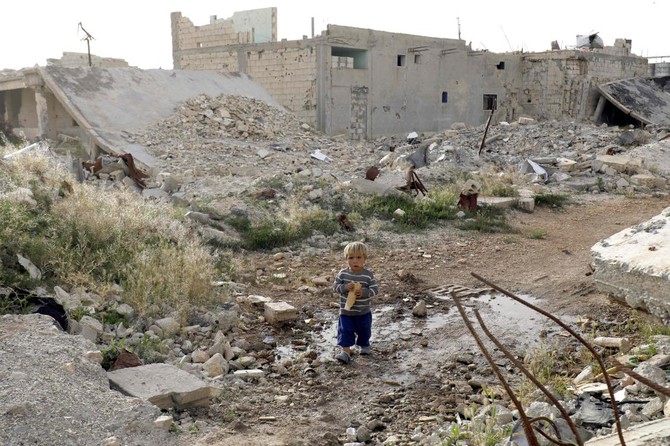
- Regime forces killed at least 15 civilians Sunday in air strikes carried out in northwestern Syria in apparent retaliation for a militant attack on two besieged government-held villages
- The bombing raids hit a string of towns and villages in the northwestern province of Idlib, which is almost entirely controlled by various militants and hard-line rebels
More than one in four Syrians ‘extremely poor’: World Bank
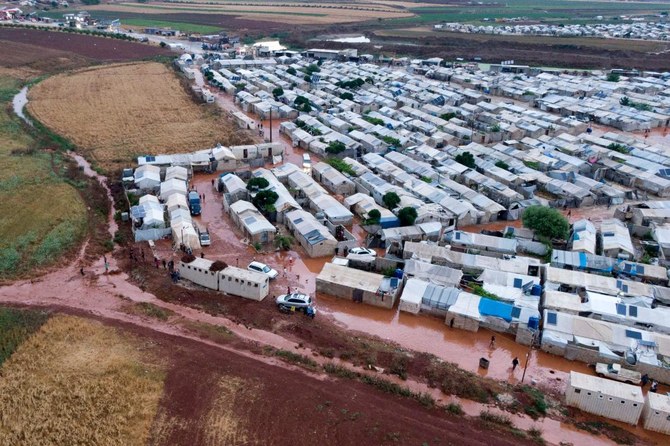
- 27 percent of Syrians — about 5.7 million individuals — live in extreme poverty
- “Continued funding shortfalls and limited access to humanitarian assistance” have further strained poor Syrians, the World Bank said
BEIRUT: More than a quarter of Syrians live in extreme poverty, the World Bank said Saturday, 13 years into a devastating civil war that has battered the economy and impoverished millions.
The World Bank published two new reports on Syria, which found that “27 percent of Syrians — about 5.7 million individuals — live in extreme poverty.”
“Extreme poverty, while virtually non-existent before the conflict, affected more than one in four Syrians in 2022” and might have further deteriorated after a deadly earthquake last year, one of the reports said.
The quake killed about 6,000 people in the country.
According to the United Nations, about 90 percent of Syrians live in poverty, while it previously estimated that around 2 million lived in extreme poverty after more than a decade of war.
The report cited neighbor Lebanon’s economic meltdown in late 2019, the Covid-19 pandemic and the war in Ukraine, as having eroded the welfare of Syrian households in recent years.
The civil war in Syria has also ravaged the economy, infrastructure and industry, while Western sanctions have added to the country’s woes.
“Continued funding shortfalls and limited access to humanitarian assistance” have further strained poor Syrians, already coping with “soaring prices, reduced access to essential services and rising unemployment,” the World Bank said.
The UN told AFP previously that its humanitarian response plan for Syria for 2024 requires more than $4 billion but that it is only six percent funded.
The international community is set to meet in Brussels Monday to try and muster funds for Syria at a yearly pledging conference.
A lack of opportunities and dwindling aid has pushed many Syrians to rely on money sent from relatives abroad to survive, with the World Bank estimating that “in 2022, the total value of remittances received by Syrian households reached about $1.05 billion.”
Syria’s estimated GDP stood at around $6.2 billion in 2023.
Syria’s “real GDP is projected to contract by 1.5 percent in 2024, extending the 1.2 percent decline in 2023,” the report said.
“Inflation is anticipated to remain high in 2024 due to the pass-through effects of currency depreciation, along with persistent shortages and potential further subsidy cuts (for) food and fuel,” it said.
Syria’s war has killed more than half a million people and displaced millions more since it erupted in 2011 after Damascus cracked down on anti-government protests.
Israel official says ‘intention’ to renew Gaza talks ‘this week’
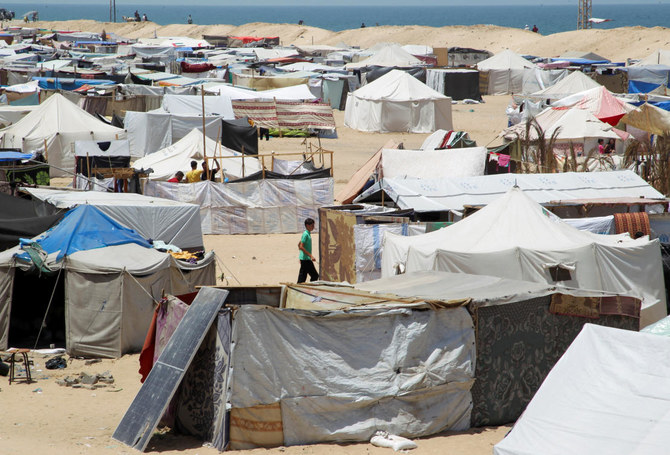
- “There is an intention to renew the talks this week and there is an agreement,” said the official
- The official did not elaborate on the agreement
JERUSALEM: An Israeli official said Saturday the government had an “intention” to renew “this week” talks aimed at reaching a hostage release deal in Gaza, after a meeting in Paris between US and Israeli officials.
“There is an intention to renew the talks this week and there is an agreement,” the official told AFP on condition of anonymity.
The Israeli official did not elaborate on the agreement, but Israeli media reported that Mossad chief David Barnea had agreed during meetings in Paris with mediators CIA Director Bill Burns and Qatari Prime Minister Mohammed bin Abdulrahman Al-Thani on a new framework for the stalled negotiations.
Top US diplomat Antony Blinken also spoke with Israeli war cabinet minister Benny Gantz about new efforts to achieve a ceasefire and reopen the Rafah border crossing, Washington said.
Talks aimed at reaching a hostage release and truce deal in the Gaza Strip ground to a halt this month after Israel launched a military operation in the territory’s far-southern city of Rafah.
The Gaza war broke out after Hamas’s October 7 attack resulted in the deaths of more than 1,170 people, mostly civilians, according to an AFP tally based on Israeli official figures.
Militants also took 252 hostages, 121 of whom remain in Gaza, including 37 the army says are dead.
Israel’s retaliatory offensive has killed at least 35,903 people in Gaza, mostly women and children, according to data from the Hamas-run territory’s health ministry.
Yemen’s Houthis postpone release of 100 prisoners belonging to government forces
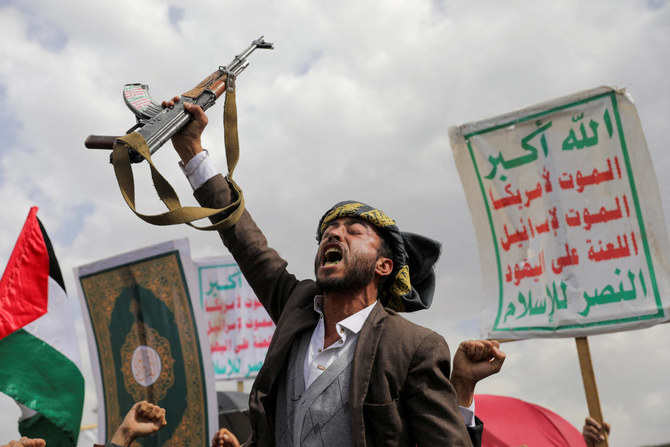
- The Houthis, an Iran-aligned movement that controls part of the country, last released prisoners in April 2023
- Yemen has been embroiled in years of civil war that has killed tens of thousands of people and left millions hungry
CAIRO: Yemen’s Houthis said they had postponed the release of around 100 prisoners belonging to government forces that had previously been announced to take place on Saturday.
A Houthi official said that the delay was because of “technical reasons,” adding the release would take place at another time.
The head of the Houthi Prisoner Affairs Committee, Abdul Qader Al-Murtada, said on Friday that the group would release more than 100 prisoners in what he called “a unilateral humanitarian initiative.”
The Houthis, an Iran-aligned movement that controls part of the country, last released prisoners in April 2023 in an exchange of 250 Houthis for 70 government forces.
Yemen has been embroiled in years of civil war that has killed tens of thousands of people and left millions hungry.
The Houthis are the de facto authorities in northern Yemen, while the internationally recognized government is represented by the Political Leadership Council, which took over power from Yemen’s president-in-exile.
Spain demands Israel comply with UN court ruling on Rafah, Britain criticizes order
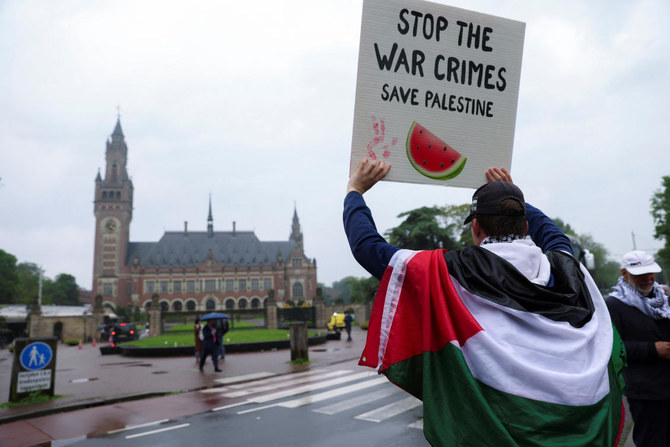
- Spanish government: Ruling by the International Court of Justice is legally binding
- British government says ruling would strengthen Palestinian Islamist group Hamas
MADRID/LONDON: The Spanish government demanded on Saturday that Israel comply with an order by the top UN court to immediately stop its bombardment and ground assault on the Gazan city of Rafah.
It stressed that the ruling on Friday by the International Court of Justice (ICJ) was legally binding.
“The precautionary measures set out by the ICJ, including that Israel should cease its military offensive in Rafah, are compulsory. Israel must comply with them,” Foreign Minister Jose Manuel Albares wrote on X.
“The same goes for a ceasefire, the release of the hostages and access for humanitarian aid (to Gaza),” he said.
“The suffering of the people of Gaza and the violence must end.”
The British government, meanwhile, has criticized the World Court order, saying the ruling would strengthen Palestinian Islamist group Hamas.
“The reason there isn’t a pause in the fighting is because Hamas turned down a very generous hostage deal from Israel. The intervention of these courts — including the ICJ today — will strengthen the view of Hamas that they can hold on to hostages and stay in Gaza,” a UK foreign ministry spokesperson said late on Friday.
“And if that happens there won’t be either peace, or a two-state solution.”
In a case brought by South Africa alleging the Israeli assault on Gaza amounts to “genocide,” the ICJ ordered Israel on Friday to “immediately halt” the ground and air offensive in Rafah.
The operations began on May 7 despite international fears for the safety of the 1.4 million civilians trapped in the city.
The Hague-based ICJ, whose orders are legally binding but lack direct enforcement mechanisms, also ruled that Israel must keep open the key Rafah crossing with Egypt to allow “unhindered” humanitarian aid into Gaza.
And it urged the “unconditional” release of hostages taken by Hamas fighters during their October 7 attack in Israel.
Israel responded on Saturday by bombing Rafah and other parts of the densely populated Gaza Strip.
Spain is one of the European countries to have been most critical of Israel over the war in Gaza.
On Wednesday, Spain, Ireland and Norway said their governments would recognize a Palestinian state from next week.
Israel summoned their envoys to “reprimand” them for the decision and on Friday said it would ban Spain’s consulate in Jerusalem from helping Palestinians in the occupied West Bank.
The war in Gaza began after Hamas’s unprecedented October 7 attack, which resulted in the deaths of more than 1,170 people, mostly civilians, according to an AFP tally based on Israeli official figures.
Some 252 people were taken hostage, 121 of whom remain in Gaza, including 37 the Israeli army says are dead.
Israel’s retaliatory offensive has killed at least 35,857 people in Gaza, mostly women and children, according to data from the Hamas-run territory’s health ministry.
Israeli strike kills two Hezbollah fighters in Syria: monitor
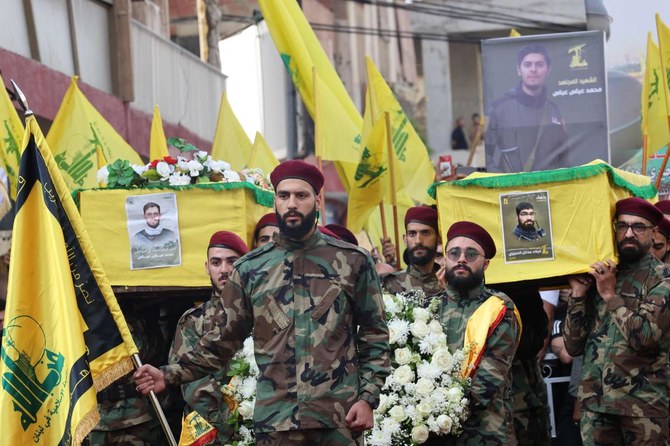
- It was the third strike against Hezbollah targets in Syria in about a week
BEIRUT: An Israeli drone strike in central Syria killed two fighters from Lebanon’s Iran-backed Hezbollah movement on Saturday, a war monitor said.
“An Israeli drone fired two missiles at a Hezbollah car and truck near the town of Qusayr in Homs province, as they were on their way to Al-Dabaa military airport, killing at least two Hezbollah fighters and wounding others,” said the Syrian Observatory for Human Rights.
It was the third strike against Hezbollah targets in Syria in about a week.
On Monday, Israeli strikes in the Qusayr area, which is close to the Lebanese border, killed eight pro-Iranian fighters, said Observatory, a Britain-based monitor with a network of sources in Syria.
At least one Hezbollah fighter was among those killed, a source from Hezbollah told AFP at the time.
Another strike, on May 18, targeted “a Hezbollah commander and his companion,” the Observatory said. It did not report any casualties.
Israel rarely comments on individual strikes in Syria but has repeatedly said it will not allow its arch-enemy Iran to expand its presence there.
Israel has carried out hundreds of strikes in Syria since the outbreak of the civil war in its northern neighbor, mainly targeting army positions and Iran-backed fighters including from Hezbollah.
The strikes have increased since Israel’s war with Hamas in the Gaza Strip began on October 7, when the Iran-backed Palestinian militant group launched an unprecedented attack against Israel.
Syria’s war has killed more than half a million people and displaced millions more since it erupted in 2011 after Damascus cracked down on anti-government protests.


